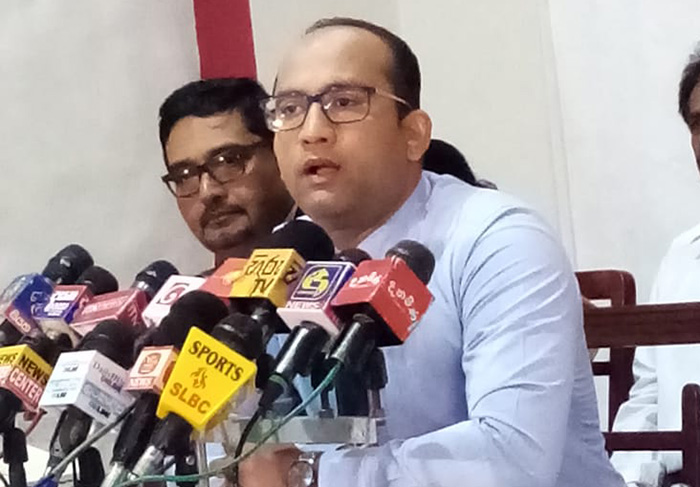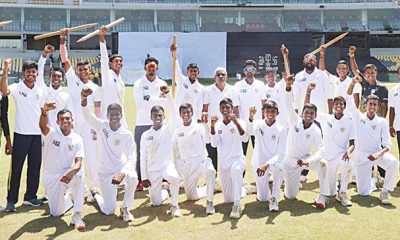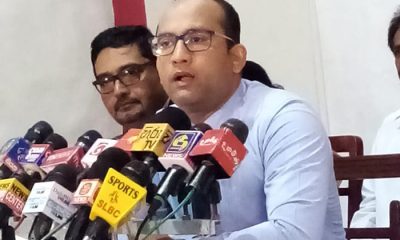Business
‘Revenue collecting PCs had only Rs. 40 billion for public service in 2021’

By Sanath Nanayakkare
There wouldn’t be a better time for major political parties to discuss and arrive at a consensus for abolishing the revenue-collecting provincial council system which hasn’t done anything more than just distributing government-sponsored welfare goods to the people, Pasanda Yapa Abeywardena, chief organiser of Lankalokaya and former provincial councilor said at a press conference in Colombo on January 19.
Pasanda who enjoys familial relationships with political higher-ups in the country while being the current chairman of Sathosa said that the President of Sri Lanka can travel across the island by helicopter in just one and a half hours which is only the size of Virginia in the United States, but has so many layers of governance including executive presidency, parliament, provincial councils, district secretariats, local government institutions etc.
“It is a known fact that provincial councils are mere training centres for the offspring of senior politicians and there is a demand in the country for cost-effective small government. In such a context, all political parties should have a dialogue in the next six months to abolish provincial councils, and strengthen the local government bodies through district development councils administered by the central government. Such a mechanism would reduce administrative layers while expanding the effective understanding of policies made by the government. Then the decisions made by the cabinet of ministers will easily flow to the ground level and the implementation process will be more dynamic. The President also has expressed similar views in this regard, he said.
“In the year 2021, revenue of provincial councils amounted to Rs. 331 billion while total expenditure was Rs. 316 billion, out of which Rs. 279 billion was spent on the payroll without having to bear the costs of provincial councilors. All in all, the provincial councils had only about Rs. 40 billion to spend on public services,” he said.
“In fact, I know from experience that nothing meaningful could be achieved through provincial councils other than merely being an institution of the central government that distributes chairs, mammoties etc., given by the government where provincial councilors claim to be the benefactors.”
“Provincial councils came to its end of term in April 2019 and five years have lapsed since the defunct of the system. Nevertheless, there is no public outcry to restore the system. PC system has never contributed to making any laws of the country or has never initiated a good programme on its own. So, we urge the political parties to engage in a meaningful discussion in the next six months before the country goes to presidential and parliamentary elections.”
He pointed out that the abolition of the PC system would help reduce the tax burden on the people, and that decision has to be taken well before PC elections are held.
Pasanda added that neither the people in the North of Sri Lanka or the government of India are interested in provincial councils anymore though the system was introduced by then government as a means of power decentralisation in Sri Lanka.”
“India is keen to have an equitable solution to the ethnic issue in Sri Lanka. However, I have reliable information that India doesn’t see provincial councils in the North and East would be an enabler in that quest. So, the abolition of provincial councils won’t trigger any geopolitical tensions with India,” he said.
Business
Seylan Bank posts a remarkable PAT of LKR 10 Bn for 2024

The Bank recorded a Profit before Income Tax (PBT) of LKR 16.04 Bn for the period under review with a 59% growth over the previous year, while recording a Profit after Tax (PAT) of LKR 10.05 Bn for the year with a 61% growth over the previous year, demonstrating a robust performance despite challenging macro-economic conditions. The reported PAT of LKR 10 Bn is the highest performance in the Bank’s 36 year history.
Net Interest Income of the Bank was reported as LKR 37 Bn in 2024 compared to LKR 40 Bn reported in 2023 with a decline of 8% corresponding to reduction in Net Interest Margins during 2024, due to reduction in market interest rates throughout the year.
Net fee and commission income of the Bank reported a growth of 7% to LKR 8 Bn compared to LKR 7.4 Bn reported in the previous year. The growth in 2024 was mainly due to increase in income from Cards, Remittances and other services relating to Lending.
The Bank’s net gains from trading reported a gain of LKR 0.46 Bn, a decrease of 44% over the gain of LKR 0.82 Bn reported in previous year due to exchange / interest rate changes.
Net gains / (losses) from de-recognition of financial assets reported a loss of LKR 0.26 Bn in 2024, compared to the gain of LKR 0.15 Bn reported in the previous year. The loss due to the restructuring of SLISBs amounted to LKR 2.71 Bn and was recorded in Q4 2024.
Other Operating Income of the Bank was reported as LKR 1 Bn in 2024, a growth of 5% over the previous year. This increase is mainly from foreign exchange income, which represents both revaluation gain/ (loss) on the Bank’s net open position and realized exchange gain/ (loss) on foreign currency transactions.
The Bank’s Total Operating Income decreased by 11.6% to LKR 44 Bn in 2024 compared to LKR 49 Bn in the previous year mainly due to decrease in net interest income and the loss on restructuring of SLISBs.
The Bank made impairment provision to capture the changes in the macro economy, credit risk profile of customers and the credit quality of the Bank’s loan portfolio in order to ensure adequacy of provisions recognized in the financial statements. The impairment charge on Loans and Advances and other credit related commitments amounted to LKR 6.6 Bn (2023 – LKR 15.5 Bn). The impairment reversal due to the SLISBs exchange amounted to LKR 4.9 Bn (2023 – LKR 1.5 Bn charge).
(Seylan Bank)
Business
An initiative to bring light into the lives of Galle residents

By Ifham Nizam
For decades, many rural communities in Sri Lanka have struggled with an unreliable power supply, outdated infrastructure, and slow responses from authorities. However, a new initiative aims to change this narrative, bringing hope to thousands in the Galle District who have long been in the dark—both literally and figuratively.
Speaking to The Island Financial Review, Dr. Chathura Welivitiya, CEO of HELP-O, an expert in infrastructure development, emphasizes the importance of this project, stating, “Access to reliable electricity is not just about lighting homes; it is about empowering communities, enabling education, fostering business opportunities, and ensuring overall development.”
He said in many villages, the lack of a stable electricity supply has hindered progress. Residents report frequent power outages, damaged lines left unattended for weeks, and new connections taking months—if not years—to be processed. Such issues have not only inconvenienced households but have also impacted local businesses, schools, and healthcare facilities.
According to a Weligama Municipal Council official: “Our children cannot study at night due to power failures. Businesses suffer because they cannot store perishable goods properly. We have raised complaints multiple times, but the response has been slow.”
Recognizing these challenges, a new project has been launched to address the inefficiencies in power distribution. The initiative includes:
Expansion of the Electrification Network: Efforts to extend power lines to remote areas that still rely on kerosene lamps or battery-operated sources.
Upgrading Infrastructure: Replacement of outdated transformers, damaged poles and weak wiring systems to ensure a stable and safe electricity supply.
Community Engagement: A digital reporting system that allows residents to highlight issues in real time, ensuring faster response and accountability from relevant authorities.
Sustainability Measures: Exploration of renewable energy options, such as solar power, to complement the grid and provide backup solutions for power outages.
Dr. Chathura explains, “This project is not just about fixing wires and poles; it is about creating a sustainable and efficient system that meets the growing energy demands of rural areas. Transparency and community participation are key to its success.”
The Southern Province Governor Bandula Haischandra has voiced strong support for the initiative, recognizing its potential to transform rural communities.
“Ensuring a stable electricity supply is a fundamental responsibility of the government, the Governor told The Island Financial Review. “For too long, these communities have been neglected. We are committed to fast-tracking infrastructure improvements and working closely with relevant authorities to resolve longstanding issues.”
The Governor further emphasized the role of accountability and efficiency in the implementation process. “We cannot afford delays and inefficiencies. With the use of modern technology, we are ensuring that complaints are addressed swiftly and that no village is left behind in development.”
Business
Elpitiya Plantations clinches fourth consecutive victory at Inter Plantation Cricket Tournament

Elpitiya Plantations emerged victorious at the 22nd Inter Plantation Cricket Tournament, organised by the Dimbula Athletic and Cricket Club, held on the 21st and 22nd of February 2025 at the Radella Cricket Ground.
The tournament saw participation from 11 plantation companies, showcasing exceptional talent and sportsmanship. Elpitiya Plantations, led by their dynamic captain Wajira Mannapperuma, demonstrated outstanding performance throughout the tournament.
The winning team from Elpitiya Plantations consisted of Wajira Mannapperuma, Asela Udumulla, Dilukshan Neshan, Lakshan Thenabadu, Kavinda Sulochana, Yasitha Koswaththa, Anushka Baddevithana, Kanishka Ranchagoda, Pramoth Bandara, and Sajith Edirisinghe.
In the semi-final match, Elpitiya faced Horana Plantations PLC and secured a decisive victory by bowling out the Horana team for just 20 runs within 4 overs, paving their way to the finals. The final match was a thrilling encounter against Talawakelle Tea Estates PLC, where Elpitiya’s formidable bowling lineup made it challenging for Talawakelle to score. Within the first four overs, Talawakelle’s top batsmen were back in the pavilion, allowing Elpitiya to clinch the championship title with ease.
This victory marks Elpitiya Plantations’ fifth overall win in the history of the tournament and their fourth consecutive triumph, having previously won in 2022, 2023, and 2024. The team’s consistent performance and dedication have solidified their reputation as a formidable force in plantation cricket.
The management of Elpitiya Plantations extends heartfelt congratulations to the team and expresses gratitude to all the supporters and organisers who made this event a grand success.
-

 Business3 days ago
Business3 days agoSri Lanka’s 1st Culinary Studio opened by The Hungryislander
-

 Sports4 days ago
Sports4 days agoHow Sri Lanka fumbled their Champions Trophy spot
-

 News6 days ago
News6 days agoKiller made three overseas calls while fleeing
-

 News5 days ago
News5 days agoSC notices Power Minister and several others over FR petition alleging govt. set to incur loss exceeding Rs 3bn due to irregular tender
-

 Features4 days ago
Features4 days agoThe Murder of a Journalist
-

 Sports4 days ago
Sports4 days agoMahinda earn long awaited Tier ‘A’ promotion
-

 Features4 days ago
Features4 days agoExcellent Budget by AKD, NPP Inexperience is the Government’s Enemy
-

 News5 days ago
News5 days agoMobile number portability to be introduced in June













